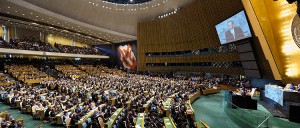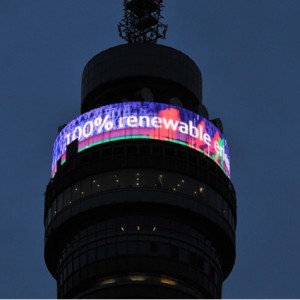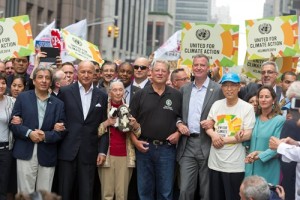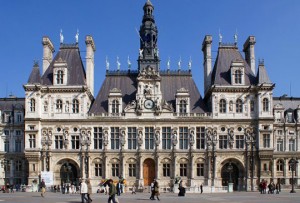Guest Blogger: Randall Krantz
Today heads of state gather in Paris to kick off the most important meeting on climate change this decade, (and possibly ever).
Last week Mike highlighted some of the problems on (and off) the agenda in Paris. While these significant challenges are not to be underestimated, there are also reasons for optimism. As far as negotiations go, this is as complicated as they get. (Imagine a prisoner’s dilemma in which there are 196 prisoners and the judge is Mother Nature.) But I have to be optimistic because I will be there, as one of many trying to support a global deal to address climate change.
Why the optimism? Leaving technology to one side, (I won’t even get started on the price of solar cells or the generating power of wind) I’ll explore the official and unofficial process that takes place, and how more people than ever, including me, are committed to success for our global climate.
Top-Down Tactics
So what can presidents and prime ministers from nearly 150 countries accomplish? The presence of heads of state at climate negotiations is not a panacea, but it helps. For many countries, such as the United States, the president is unable to make a unilateral commitment on climate change due to the checks and balances of the government they represent. However, the presence of our world leaders does influence the public perception of climate change as an issue of state , rather than one only of concern to environmentalists.
It also sends a powerful signal to negotiators who follow them over the next two weeks. At the last big negotiation on climate in Copenhagen in 2009, the heads of state came in at the end and endured a 40 hour marathon, through which many of them did not sleep. Ultimately, national leaders were too little to late to save the negotiations in Copenhagen. Learning from past experience, the French hosts of this year’s negotiations placed them up front, so that the details of their ambition can be sorted out after they have left the table.
 Bottom-Up Commitments
Bottom-Up Commitments
The world has changed a lot since the first Earth Summit in Rio in 1992. If you listen carefully, some people will tell you that, 23 years ago, equity was not in the agenda. I have heard that the negotiated discussions were more like a steamroller powered by vast squadrons of negotiators from rich western countries.
While the squadrons of negotiators have changed little, alliances between developing countries have given them a stronger voice and more power. Ironically, this is one of the main reasons why negotiations have been so slow over the past decade, as intractable problems related to responsibilities and commitments of rich and poor countries have ground compromise to a halt.
At the climate negotiations in Lima last December, however, a “bottom-up” solution was proposed and agreed. Countries committed to – and have since delivered on – national commitments to act on climate change. As of this writing, commitments have been made by 170 countries and represent 90% of the world’s greenhouse gas emissions.
The Kyoto Protocol, agreed in 1997, placed the onus of lowering emissions only on rich countries, making countries like the US, Canada and Australia unwilling to commit. This time around, all countries are seeking to share the responsibility. While some commitments leave room for questions, such as those made by India and Qatar , commitments made by EU countries are ambitious and China commits to peak its emissions by 2030.
These collective commitments are also not the end of the road, as together they will not slow climate change enough to limit warming to the agreed 2C target as reported by the New York Times. They are, however, a starting point for the negotiations, and present an unprecedented level of transparency. With more cards on the table, this can only help everyone aim for a winning hand.
 Stakeholder Support
Stakeholder Support
Whatever happens at the negotiating table, national governments won’t be implementing climate solutions alone. It will ultimately be the companies, cities and citizens who will make any commitments a reality. In this respect, much of the success of the UN process may be moot, as some of the world’s most influential stakeholders will be driving solutions regardless of the outcome in Paris.
When we think of stakeholders concerned about climate change, most obvious are the large numbers of social and environmental NGOs who will be both inside and outside of the negotiations. While their pressure tactics have not always worked in the past, there is an increasing sense of inclusivity among those fighting climate change, as NGOs are increasingly working in partnership with governments and business to make change happen.
Perhaps a bit less expected are the private sector companies who want to see an ambitious deal on climate change. The reasons for their support may vary, but the result in the same: a series of strong commitments to reduce emissions, use renewables and pressure investors.
For example, a coalition of companies and NGOs called “We Mean Business” (link) brings together commitments of 325 companies representing more than $6 trillion in revenues and nearly $20 trillion in assets under management. Meanwhile, the UN Global Compact is supported by more than 8,000 companies in 160 countries, and the World Economic Forum, which recently issued an ambitious statement from CEOs of 78 of the world’s largest companies.
Public support
In Paqris, I will be one of many – over 25,000 – accredited delegates and a similar number of “extras” who are expected to convene at Le Bourget and around Paris over the next two weeks.
 While the possibility of demonstrations in Paris over the coming weeks is likely to be curtailed for security reasons, there will still be strong motions of support all over the world. Events like the NY Climate March , which gathered over 300,000 people in 2014, including the UN Secretary General Ban Ki-Moon and Al Gore, place a good deal of very public pressure on governments to come up with robust solutions.
While the possibility of demonstrations in Paris over the coming weeks is likely to be curtailed for security reasons, there will still be strong motions of support all over the world. Events like the NY Climate March , which gathered over 300,000 people in 2014, including the UN Secretary General Ban Ki-Moon and Al Gore, place a good deal of very public pressure on governments to come up with robust solutions.
My role this week is organizing a convening of over 500 mayors from around the world. They will meet to compare strategies and inspire negotiators from around the world. Invited by Michael Bloomberg, former Mayor of NY, and Anne Hidalgo, the Mayor of Paris, mayors attending the Climate Summit for Local Leaders will be sending a message of ambition and optimism. They will be telling world leaders that cities have already committed to addressing climate change, and that national leaders can therefore commit with confidence.
 As I pack my bags for Paris, I reflect on my own optimism and on the role of the indomitable human spirit to drive for success over the coming weeks. Alongside my realism and next to my socks, I am packing a healthy dose of optimism, because when you are in deep on environmental issues, this is the only way to pack!
As I pack my bags for Paris, I reflect on my own optimism and on the role of the indomitable human spirit to drive for success over the coming weeks. Alongside my realism and next to my socks, I am packing a healthy dose of optimism, because when you are in deep on environmental issues, this is the only way to pack!
Randall Krantz is the Founder of Constellate Global, a firm dedicated to building partnerships in the environmental and humanitarian landscape, and Former Director of the Sustainability Initiative of the World Economic Forum as well as the founder of IESE’s Responsible Business Club.

